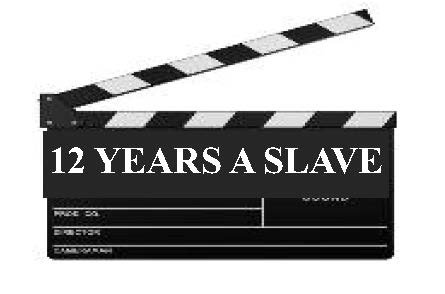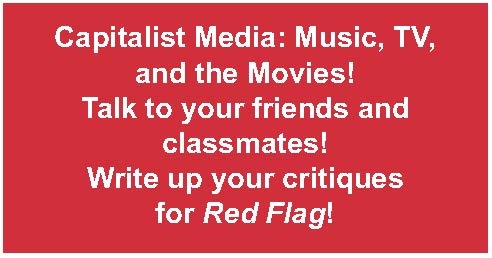
MOVIE REVIEW
The movie, "12 Years a Slave." Is adapted from
the 1853 memoir of Solomon Northup, a freeman,
kidnapped in 1841 and sold into slavery
in the Deep South. This review is based on
viewing the movie twice and reading the complete,
Twelve Years A Slave, Narrative of
Solomon Northup. When you look at the difference
between a movie and the original
source (the book), you see the political point
of view of the movie.
In the movie, Solomon sits huddled with two
other prisoners on a slaver's boat headed
south. One prisoner insists that they should
fight their crew. A second disagrees: "Survival's
not about death. It's about keeping your
head down."
Solomon says," Now you tell me all is lost? I
want to live." This conversation isn't in
Solomon's narrative.
According to Solomon's narrative, he and two
other prisoners, Arthur and Robert, plot to
"steal… the captain's cabin, seize the pistols
and cutlass, and … dispatch him and the
mates. Robert, with a club, was to stand by
the door…and beat back the sailors…. We resolved
to regain our liberties or lose our lives."
Once they took over the boat, they planned to
make their way to New York Harbor although
they "knew little of the compass." The escape
plan wasn't carried out because Robert died
from smallpox.
Solomon's first slave master is William Ford, a
wealthy "Christian" man. However, Ford falls
into debt and sells Solomon to John Tibeats
who works his slaves "from earliest dawn until
late at night." When Tibeats attempts to whip
Solomon for a dubious offense, he fights back,
and with his foot on Tibeats' neck, whips him
"until my arm ached." Afterwards, when
Tibeats and two associates attempt to lynch
Solomon, an overseer (armed with two pistols)
intervenes and saves his life. Tibeats backs off.
Later he attacks Solomon with a hatchet and
he again bests the master, "an act in that state,
punishable with death." Solomon flees from
the plantation chased by hounds and escapes
through the swamp. He makes his way to
Ford's plantation where he is protected from
harm. These fights are in Solomon's narrative;
however, in the movie, it is one fight between
Solomon and a lowly overseer, not a slave
master, and focuses on Solomon dangling by a
noose in the hot sun from morning until late
evening.
Tibeats sells Solomon to Edwin Epps, a sociopathic
slave master. Soloman spends ten years
on Epps' plantation and is eventually freed
and reunited with his family.
This movie focuses on victimization, survival,
and brutality, not resistance and evokes sympathy,
not admiration for courage. It argues that
liberation lies in going through the proper
channels. There are no militant mass fighters
against slavery, no Frederick Douglasses, Harriet
Tubmans, or Nat Turners here.


BALANCING POLITICAL COMMITMENT WITH EVERYDAY LIFE
My struggles as a communist and as a
student have always been a challenge for
me. I was first introduced to ICWP when I
was in high school thanks to someone on
my high school campus who would distribute
Red Flag to students. After reading a
couple of issues of Red Flag, I decided to
join ICWP. Joining the party involved continuing
to read and discuss Red Flag, but I
also began writing for our paper and participating
in sales. At times I found it very
easy to balance high school, activities,
family, and the party because I had less
responsibility. As time progressed, it became
harder for me to commit to all the
activities I was once able to do.
Now, as a community college student, I
still struggle constantly with assignments,
classes, family obligations, and making
time for our party. What makes things
even more complicated is that I also have
to balance these responsibilities with a job
to help support my family. As communists,
we know that mobilizing the masses to
abolish capitalism and build communism
also involves trying to survive under it,
while it still exists. Although I feel conflicted
at times, I have found other ways to
contribute to our cause of building a communist
society.
I have decided to write more for Red Flag and to express our communist point of
view in my writing assignments, especially
on global issues that affect the working
class. I will also speak with my friends
and fellow students about communism.
By writing this, I hope to help other working
students understand that, no matter
what else we have going on in our lives,
we can always find ways to contribute to
our party and the fight for communism.
To my fellow student comrades around the
world, what challenges do you have in balancing
your schoolwork, and other commitments,
with your commitment to ICWP
and building communist revolution? What
are some ways you have found to resolve
them?
--Red Student
"FLIES" Article was Biased: We Need Rules
Response to Review of "Lord of the Flies"
I believe that this book review was unfairly biased
and that only certain areas were pinpointed
to make a point. The author of the
article picked the worst moments of the novel
to illustrate his point that capitalism warps the
natural state of people.
I believe that how the book portrayed the boys
is, in fact, the natural state of adolescents. The
novel is about young boys, stranded and unsupervised
on an island and it shows their natural
state: violent and aggressive. So, to say that all
men are naturally violent and aggressive, due
to their nature being tainted by capitalism, is
inaccurate. This is why rules are needed.
Young people need guidance from elders and
guidelines of how to behave; rules provide
those guidelines. To take the novel Lord of the
Flies and say that the young boys featured in it
are a representation of all humanity, is not fair,
due to them being young and not fully shaped
by a society which provides rules in order for
them to adequately function as people.
Doing this is the same as taking a book on
small children and saying that men, in their
natural state, are whiny, immature, and irresponsible.
It is a misrepresentation and it can
be used to support a bias on humanity, such as
Lord of the Flies was.
—Reader
Response to Critique
Thank you, comrade, for your critique. We
hope more young people take time to respond to
articles they feel strongly about. Your response
provides an opportunity to clarify some points
we made in the review. People are products of
upbringing (external) and nature (internal) when
it comes to morals and values.
External influences include our parents,
friends, teachers, media, etc. and the ways the
system we live under has us relate to each other.
The internal includes our natural contradictions
such as selfish vs. considerate of others,
greedy vs. giving, violent vs. calm, individualistic
vs. collective etc. These ways of being have
nothing to do with rules and/or laws, but are
struggles with ourselves.
Dialectics tells us that while the external is necessary,
the internal is primary. So, while Capitalism
nurtures our selfish, greedy, violent,
individualistic side, this does not mean that we
lose our ability or desire to be considerate, giving,
calm and collective. A communist society will
work to bring out the latter by design of our social
relations to each other and communist education.
—Writer
Next Article
|



